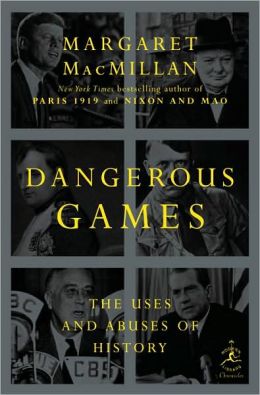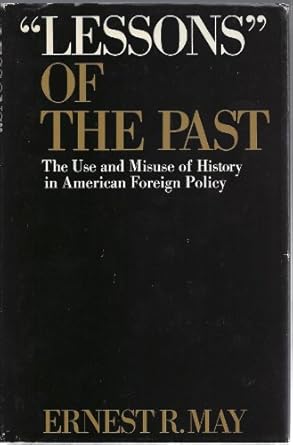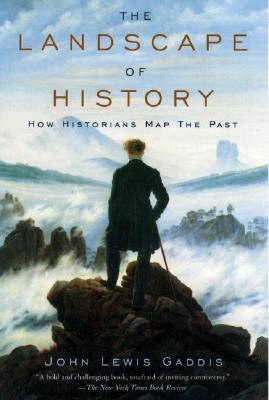Eleven intrepid members of our History Book Club braved the wind and rain for an evening discussion of the practice of history and the uses of history. The Kensington Row Bookshop again offered its hospitality to our group.
Eli Sola-Sole, who runs the Bookshop asked that we share the news of the upcoming
We tried a new approach in this meeting with people reading a book of their own choice on the subject People had read:
Eli Sola-Sole, who runs the Bookshop asked that we share the news of the upcoming
Sunday April 27th 2014, 11am-4pm
Howard Avenue, Old Town Kensington, Md
We tried a new approach in this meeting with people reading a book of their own choice on the subject People had read:
- Dangerous Games: The Uses and Abuses of History by Margaret MacMillan
- The Landscape of History: How Historians Map the Past by John Lewis Gaddis
- "Lessons" of the Past: The Use and Misuse of History in American Foreign Policy by Ernest R. May
- What Is History? by Edward Hallet Carr
The discussion was lively as usual. We had read Margaret MacMillan's book in 2010, and it describes several ways history is used, such as how historical stories can help people feel comfortable when confronting uncertainty. History can be used well in creating a sense of unity in a nation-state, but also has the danger of fueling conflict among ethnic groups as they make conflicting claims of ownership of land and property; indeed, we suspected that many of the situations in which people resort to violence rather than living peacefully together were based on this kind of misuse of history.
One of our members, who had majored in history in graduate school, made the comment that all the graduate schools now seem to focus on quantitative methods for the study of history, and none allow students to do narrative history using qualitative approaches. A second member, who had majored in political science in graduate school noted that that was true also in his field. Both were concerned that the emphasis on quantitative methods sometimes was instead of good thinking on important issues.
We noted that the questions being asked by historians today are different than those asked in the past. We all were brought up with a "great man" approach to history, while now there is much more interest in women's history, black history, and histories of other actors. A Midwife's Tale: The Life of Martha Ballard, Based on Her Diary, 1785-1812 by Laurel Thatcher Ulrich was mentioned as a book helping to broaden our understanding of colonial America (especially as Ballard was the subject of a TV program popularizing the knowedge). We noted that the further back in time one goes, the less information that there is available to historians about the common people.
It was noted that sometimes historical papers misuse statistics, which got us into a discussion of the problems of peer review of journal articles. We also noted that statistical packages make it easy to provide analyses that appear knowledgeable but have the difficulty that they may disguise poor understanding by the authors of the study. We thought it might be interesting for some future meeting to choose an article from a professional history journal to discuss, rather than a book.
MacMillan got us talking about "what history is good for" and we recalled the final comment from that discussion -- we read history because we like to.
We then moved to discuss the use of history in foreign policy, drawing on May's book. We noted his thesis that frequently White House leaders surround themselves with like-minded people of similar backgrounds, and tend to draw on historical antecedents from their own experience during times that they were already in high office. (It was noted that these days the executive branch has historians, as does the Congressional Research Service.)
May points out that in a situation such as occurred in the post war planning after World War II, it was important to have historical understanding of the places in which actions would be taken (e.g. Germany, Japan), but also of U.S. public opinion, of the Congress and of the government bureaucracy.
We chatted about the utility of a White House Council of Historical Advisors, perhaps like that of the Council of Economic Advisers or the scientific advisory panels organized by the White House Office of Science and Technology. Such a body might help to identify historians whose expertise was specifically relevant to the issues before the decision makers.
Experts in each relevant field might help identify alternative historical events for consideration by the decision makers -- comparable situations illustrating alternative actions and outcomes. They might help to avoid analyses of those historical events that had been challenged as failing to utilize relevant information or utilizing data which had been shown to be questionable.
One of our members kicked off the discussion of Gaddis' book saying how much she liked it, noting that another had been so annoyed by the early chapters as to give up reading the book entirely.
Gaddis suggests that many historians seem to have a desire to make history more like the social sciences. We noted the anecdote of William McNeill, describing his approach to writing history -- thinking, then reading and researching, refining his original ideas, and then iterating the process. This was greeted by a physicist who said it was also the process of physics.
Gaddis talks about the relation of historical methods to scientific methods. This relates to the earlier point of the focus on quantitative methods in history departments. Certainly historians have difficulty developing hypothesis tests for historical theories. On the other hand, sciences from cosmology, to ecology, to systematic biology, to evolutionary genetics tend to use methods much like those of traditional historians.
Gaddis suggests that historians write first to convince themselves of the correctness of a narrative, and then the quality of that narrative is judged by the degree that it convinces other historians. Clearly it is an important function of the profession to subject reports of historical research to professional peer review. It is only people who are thoroughly familiar with previous research on the subject, who have themselves explored relevant original sources, who can fully appreciate novelty, and fully criticize the sources and analysis in a new study.
On the other hand, history buffs like the members of this club are better served by people who write well for the intelligent generalist. Such writers will tend to draw on secondary sources rather than present their own research into original sources. They help us to gain the larger picture.
We frequently complain about the teaching of history in our schools and the history text books used in those school classes. (The school boards that select texts and pass on curricula are sometimes more interested in teaching the preferred historical myths of their members rather than the best estimates of the facts or the more complete view of the past.)
One of our members had read What is History by E. H. Carr. This book, first published in 1961. This was from a series of lectures. (The MacMillan and Gaddis books also seem to read like series of lectures compiled in a book.) It is perhaps the classic in the field, read still by those preparing for a career as historians.
We had been discussing (on the Internet) reading a book related to the current crisis in Ukraine and Crimea. That led us into a discussion of the crisis. One of our members had been to Odessa several years ago and again last year, and stressed how much change he had noted; he felt strongly that a very recent book would be necessary to understand the most relevant situation.
We noted that the Crimea is almost an Island, which only became part of Ukraine in 1954 (to celebrate the 300th anniversary of the union of Russia and Ukraine). Moreover, it has a special status in Ukraine, and is important to Russia as a naval base. Russian tourism and export industries are economically important to Crimea.
Few of us had read any Ukrainian history and there was an interest in a book which briefly sketches the distant roots of the current situation. (Indeed, the crisis involves Russia, Turkey, Poland, the EU and the USA, and we have not read much of the relevant history.) It clearly will not be possible to find a book of manageable length that looks at recent and distant history, both specific to Ukraine and Crimea and general to the countries with interest in the conflict. We decided to try to replicate the experience of this evening, letting every member read a book of his choice, and bring together the different viewpoints in our May 14th meeting.




No comments:
Post a Comment